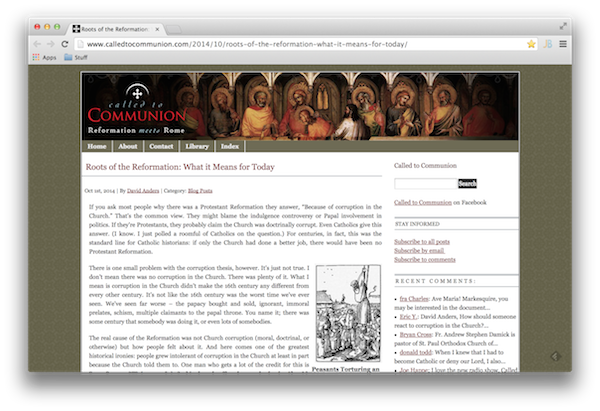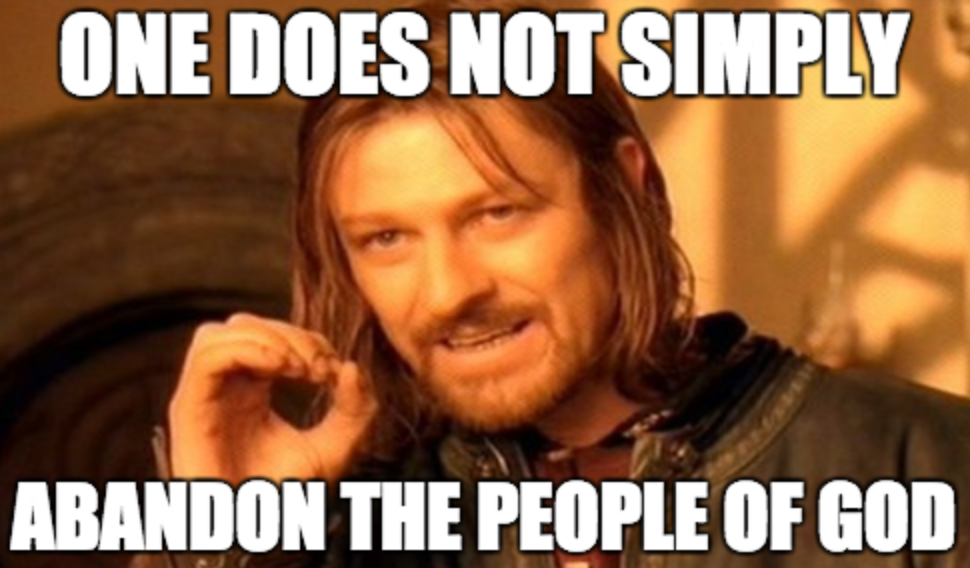The Reformation PiggyBackers
 Hahahahahaha… Bravo Lutheran Satire, bravo…
Hahahahahaha… Bravo Lutheran Satire, bravo…
"We are travellers…not yet in our native land" – St. Augustine
 Hahahahahaha… Bravo Lutheran Satire, bravo…
Hahahahahaha… Bravo Lutheran Satire, bravo…
Here’s an article I really enjoyed from Called To Communion on the roots of the Reformation:

A Protestant friend and I were recently talking about the Reformation. I was talking about the problems with what Luther and the others did. In reply, he asked me: “What should they have done? What does real reformation look like?”
I had planned to write a post as a response, but then I remembered that my friend Meg had already done it. Enjoy…
Today’s “Quick Apology” comes from a conversation a friend of mine recently had with a Reformed Protestant. It’s actually a bit of a long response for a “Quick” apology, but oh well…
“I’ll concede that the case for the historical church being the Catholic church is very strong. However, the chosen people (the Israelites) were consistently disobeying God throughout history and eventually ended up crucifying Christ. Throughout history the chosen people abandoned God. What makes you think that the Catholic Church hasn’t done this or won’t do this?”
Here, the Protestant is admitting to many of the claims of the Catholic Church, but appears to be challenging the Church’s continued status as Christ’s Church, as well as calling into question her continued authority.
It must first obviously be admitted that sinners are found in the Catholic Church. After all, why else do you think I’m allowed membership?!. However, a few points should be made…
Israel certainly sinned over the course of Salvation History. However, would it mean that because of this, it would be better for a Jew or Gentile to abandon God’s people and “go it alone”? Of course not! If one left Judaism, thinking that this couldn’t possibly be the true religion due to the hypocrisy of some of their rulers and many its followers, then one would be making a huge mistake!
As Saint Paul said, “…to them belong the sonship, the glory, the covenants, the giving of the law, the worship, and the promises; to them belong the patriarchs“ (Romans 9:4-5). The Lord had given to Israel many wonderful gifts for the sake of salvation. It would be crazy to reject these gifts and walk away!
However, we actually have an example in the Old Testament of when some members of Israel did just that. After King Solomon’s death, his son ascended to the throne (1 Kings 12) who was a complete tyrant. The northern tribes refused to follow him and this resulted in the division of the Kingdom: the Kingdom of Israel in the north and the Kingdom of Judea in the south. This separatist movement received the condemnation of the prophets. Not only had they abandoned their rightful king, they had cut themselves off from the priesthood, the Temple and the sacrifices.

 One essential difference which divides Catholics and many Protestants is the question of faith and works in salvation. The disagreement began at the Reformation. In fact, the “material principle” of the Reformation was that we are saved “Sola Fide”, by “Faith Alone” and that works have no place in our justification whatsoever.
One essential difference which divides Catholics and many Protestants is the question of faith and works in salvation. The disagreement began at the Reformation. In fact, the “material principle” of the Reformation was that we are saved “Sola Fide”, by “Faith Alone” and that works have no place in our justification whatsoever.
This subject often comes up when speaking with Protestants. I think most Catholics have had the experience at one point or another of being told by a Protestant that Catholicism doesn’t preach the Gospel, teaching instead that we have to earn our salvation. St. Paul’s epistles to the Romans and Galatians are often cited during such an exchange.
When this has happened to me in the past, I tend not to dwell too long upon the person’s interpretation of Paul’s epistles. I usually simply point out that in those letters St. Paul is contrasting faith in Christ with the works of the Mosaic Law. I turn then to the Epistle of James, since it presents a bit of a problem if someone wishes to say we’re saved by faith alone…
Over the last few days I’ve been looking at the subject of Sola Scriptura. Today I would like to discuss the alternative to Sola Scriptura which I realized made more sense of both history and the Biblical data…
Ironically, the answer itself was in Scripture. After the Ascension, writing the New Testament wasn’t the priority because it wasn’t what Jesus commanded the Apostles to do. At the Great Commission Jesus told His disciples to “teach” all nations what He had taught them (as opposed to write a book). If you wanted to know the truth in c. 30AD you would go to Jesus. Who would you go to after the Ascension? You would go to the Apostles He taught and commissioned. It was this living Tradition that sustained the Church – primarily by orally passing on to others what Jesus had taught. Jesus wanted to found a Church, not a book club.
In the Book of Acts, when there was a disagreement over the question of Gentile circumcision, the Christians didn’t use Scripture to decide the answer, but called a Church Council. I could only think of one Church today which still calls [Ecumenical] councils to resolve matters of doctrine and practice…
The more I read Scripture, the clearer it became that the Early Church was one which exercised authority (1 Corinthians 16:16, Hebrews 13:17) given to her by Christ – to forgive sins, no less! Even in my most anti-Catholic moments I could still clearly see that Matthew 16 showed Christ giving Peter a special authority. I could only think of one Church today which claimed to still have that same authority passed on from Peter….
“If a man does not hold fast to this oneness of Peter, does he imagine that he still holds the faith? If he deserts the Chair of Peter upon whom the Church was built, has he confidence that he is in the Church?” – St. Cyprian (A.D. 251)
For the last two days I have been looking at the Protestant doctrine of Sola Scriptura. Yesterday I looked at the problem of doctrinal unity and interpretation created by this doctrine. Today I would like to look at the other problem which I saw as I began to reconsider my allegiance to this belief.
Problem #2: The Bible’s origin and teaching
The second problem which really started to trouble me was the Bible itself. A monk from my home parish asked me the question: “Which came first? The Church or the Bible?”. The answer was obvious – the Church came first.
I recall another time when I was ranting about Catholics not reading their Bibles (I still do!). This monk asked me how the early Christians grew in their faith without each having access to their own leather-bound New Jerusalem Bible.
My thinking had been somewhat backwards and these two questions gave me pause for thought.